Find out why bitter foods are important for your gut, and improve your digestion by making this dandelion, orange, ginger, and cacao digestive bitters recipe with ingredients you likely already have in your pantry.
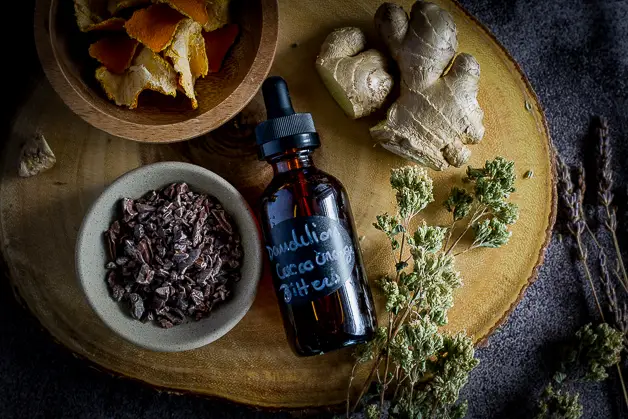
Jump To
- What Are The Benefits Of Digestive Bitters?
- What Are Bitter Foods?
- What Are Digestive Enzymes And How Do They Affect Digestion?
- What Role Does Bile Play In Digestion?
- Why Do You Need Stomach Acid?
- What Are Bitter Herbs?
- Why You'll Love This Dandelion Orange Ginger And Cacao Bitters Recipe
- Ingredients Needed
- Let's Make It
- Top Tips + FAQs
- More Recipes You Might Like
- 📖 Recipe
- 💬 Comments
If there is one thing we could all use more of in our lives, it is bitter food. Believe me, I had the same reaction you're having if you're thinking, NO WAY. But it turns out, yes, if you want to improve digestion, one of the best things you can do is eat bitter foods. And if bitter foods are not appealing to you (yet), digestive bitters can help.
In this post, I want to share the benefits of bitters, how bitters can improve digestion, why bitter food is good for you, how bile plays a role in digestion, why digestive enzymes are important for digesting food, and why contrary to popular belief, stomach acid is a good thing and so much more!
So let's dive right in and start with the most important part.
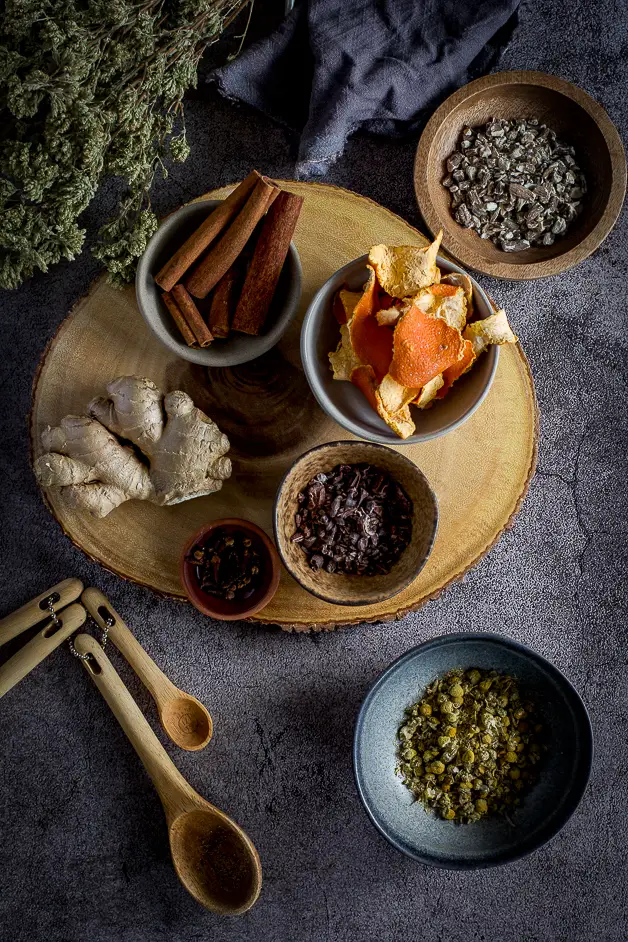
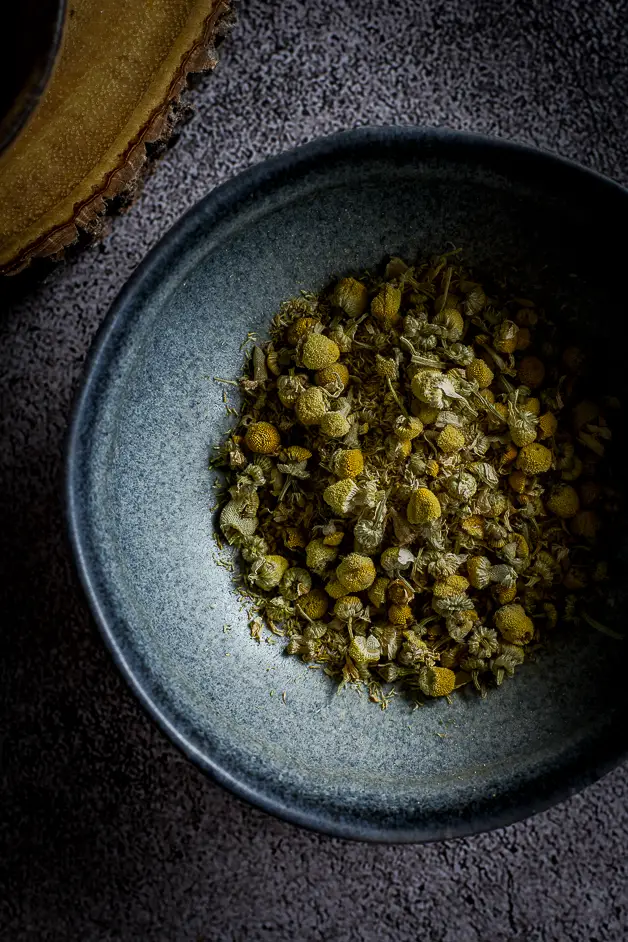
What Are The Benefits Of Digestive Bitters?
Bitters have long been used for improving digestion. They are helpful for relieving heartburn and assisting the liver in releasing digestive enzymes, which are key to breaking down food. In addition, bitters stimulate the production of hydrochloric acid, which is needed for protein breakdown in the stomach and also helps your body absorb vitamins. In addition, bitters are great for easing bloating, gas, and constipation, maintaining healthy blood sugar levels, and regulating the digestive tract.
What Are Bitter Foods?
Bitter food is all around us and including more of it in our diets is a sure way to improve digestion. And of course, we're primed biologically to only crave sweet and salty food, but once you start including more bitter foods in your life, you'll start seeing the benefits they have on your body and overall well-being.
These are the most common bitter foods you can find in your local grocery store:
Broccoli
Brussels sprouts
Kale
Dandelion leaves
Dark chocolate
Watercress
Spinach
Sesame seeds and tahini
Cauliflower
Coriander
Green tea
Coffee
Bitter melon
Arugula
Radishes
Citrus peels
Cinnamon
Endives
Ginger
Artichoke
Broccoli rabe
Cranberries
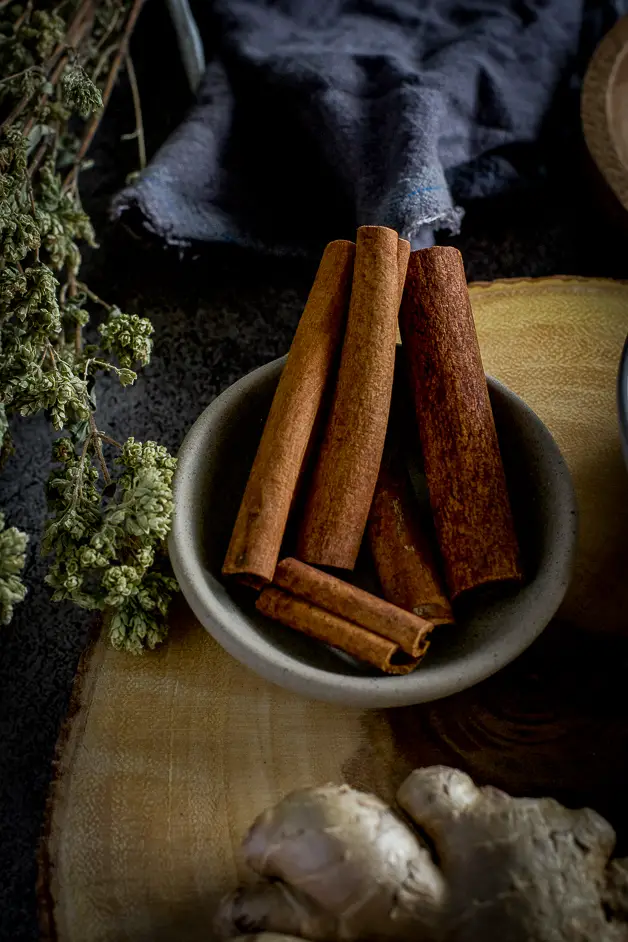
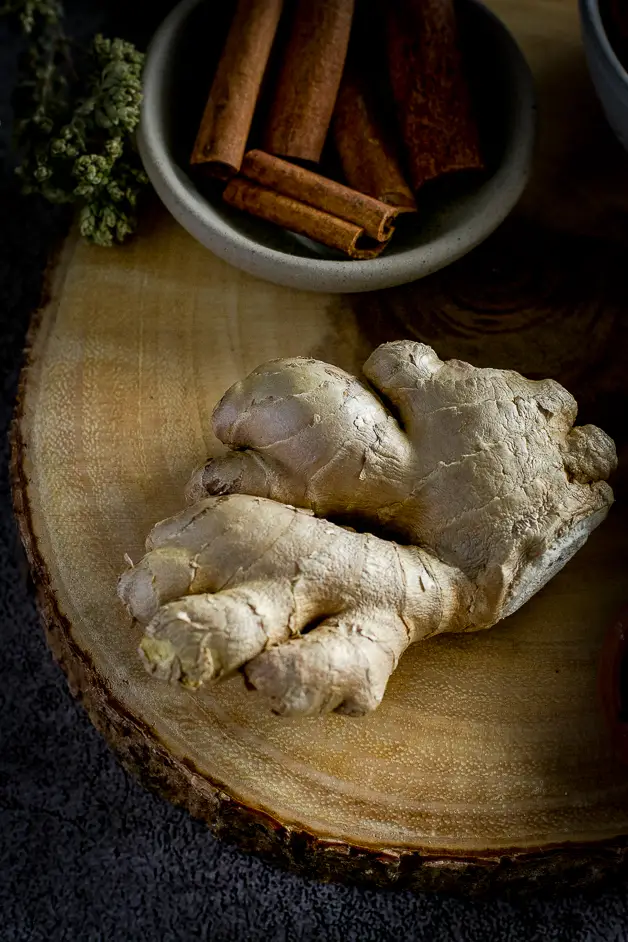
What Are Digestive Enzymes And How Do They Affect Digestion?
Digestive enzymes are proteins produced by the stomach, small intestine, and most importantly pancreas. Digestive enzymes are necessary for the breakdown of carbohydrates, proteins, and fats. The moment we smell food, our bodies start to produce saliva and digestive enzymes, preparing to receive food. There are 3 main digestive enzymes: amylase for breaking down carbohydrates, lipase for breaking down fats protease for breaking down protein. There is also sucrase for breaking down sucrose and lactase for breaking down lactase. The latter two are often ones certain people don't produce enough of, resulting in intolerance, bloating, gas, diarrhea or constipation, etc.
What Role Does Bile Play In Digestion?
The role of bile is often less talked about but nonetheless, the gall bladder releases this concentrated fluid which is essential for breaking down fats and fat-soluble vitamins and converting them to fatty acids that the body can then absorb.
Why Do You Need Stomach Acid?
Without enough stomach acid, (aka HCL or Hydrochloric acid) protein, minerals, and vitamins are not properly broken down and end up going through the digestive tract undigested. This can cause a whole host of complications, including nutrient deficiency, and leaky gut (intestinal permeability).
Having enough stomach acid helps kill and neutralize pathogens, bacteria, and yeast. Having these get past the stomach can dysregulate the delicate microbiome balance in the body, resulting in too many bad bacteria, which can result in intestinal permeability, SIBO, and in some cases autoimmune disorders.
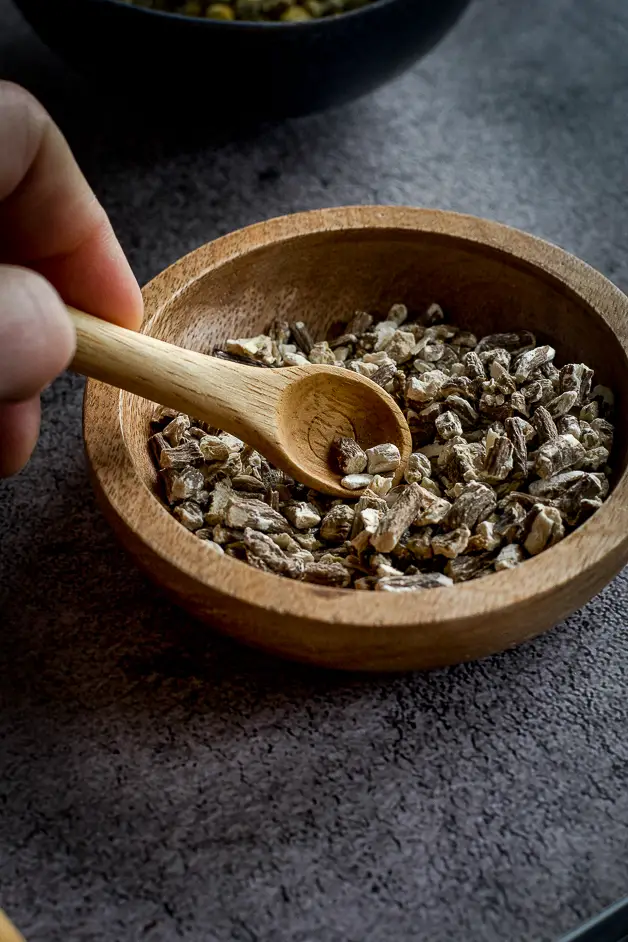
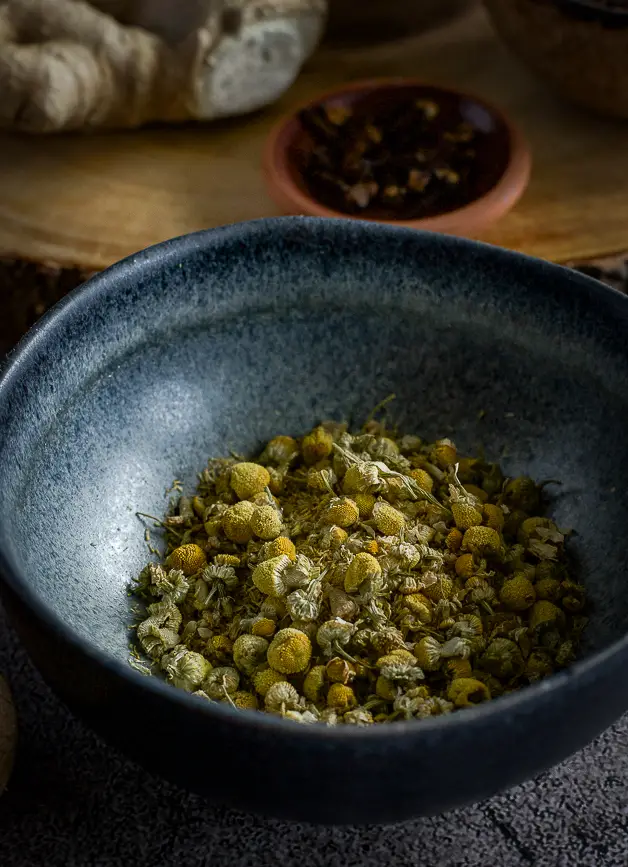
What Are Bitter Herbs?
Bitter herbs range from very common household herbs to more obscure ones you may not have heard about. But here is a list of the ones most frequently used for digestion and liver support.
Angelica
Chamomile
Centaury
Wormwood
Gentian
Dandelion root
Yarrow
Burdock root
Blue vervain
Cacao
Mugwort
Milk thistle
Cinnamon
Chickory
Hops
Goldenseal
Peppermint
Now that you know why bitters play such an important role in digestion, let's get to making a simple orange ginger and cacao digestive bitters recipe with ingredients you likely have in your pantry.
Why You'll Love This Dandelion Orange Ginger And Cacao Bitters Recipe
- It's great for your digestive system
- It regulates digestive motility
- Can improve bloating and gas
- Helps to soothe an upset stomach
- Increases stomach acid
- It helps to regulate blood sugar levels
Ingredients Needed
- Dandelion root
- Ginger
- Cinnamon
- Chamomile
- Cacao nibs
- Orange peels
- Cloves
- Vodka
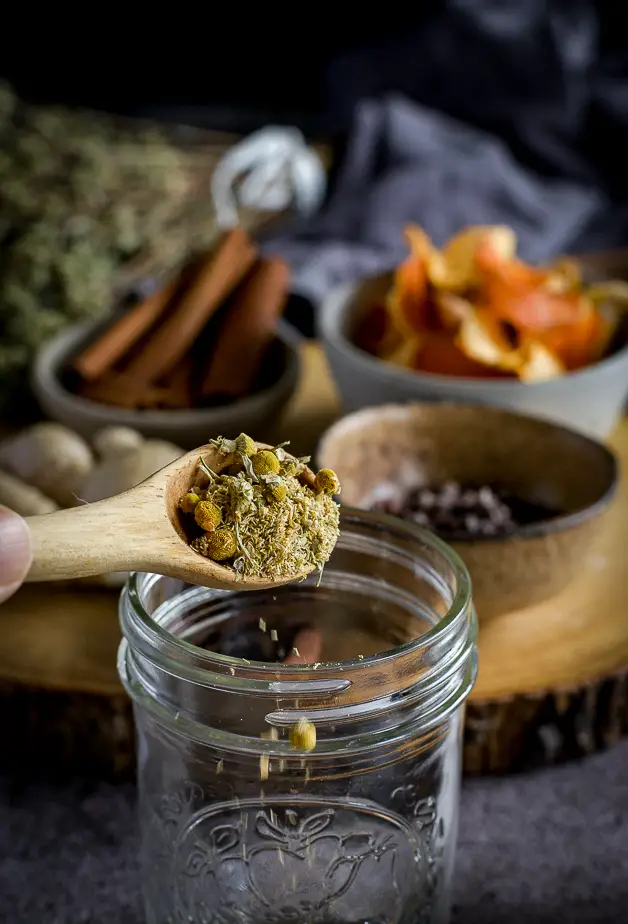
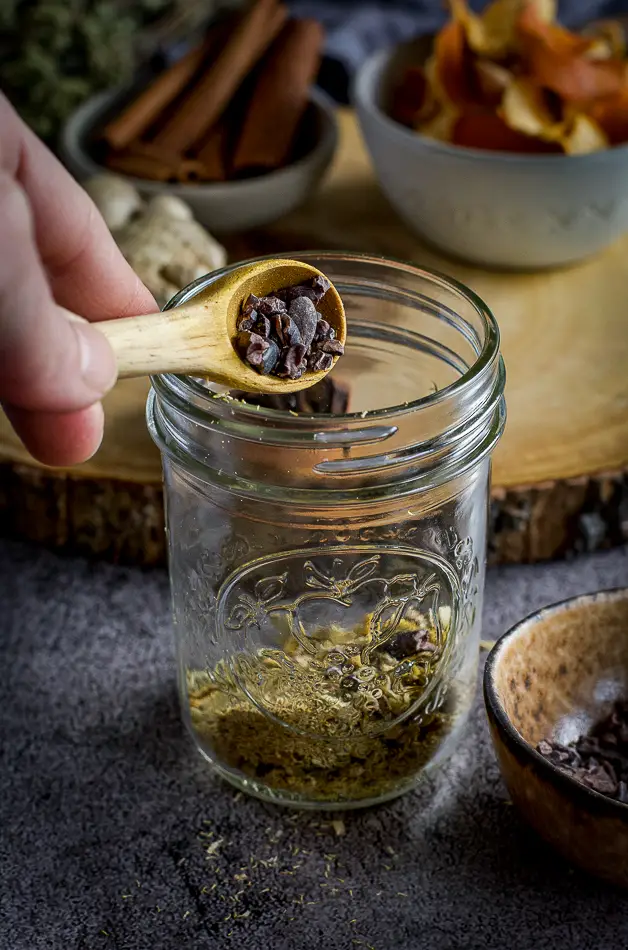
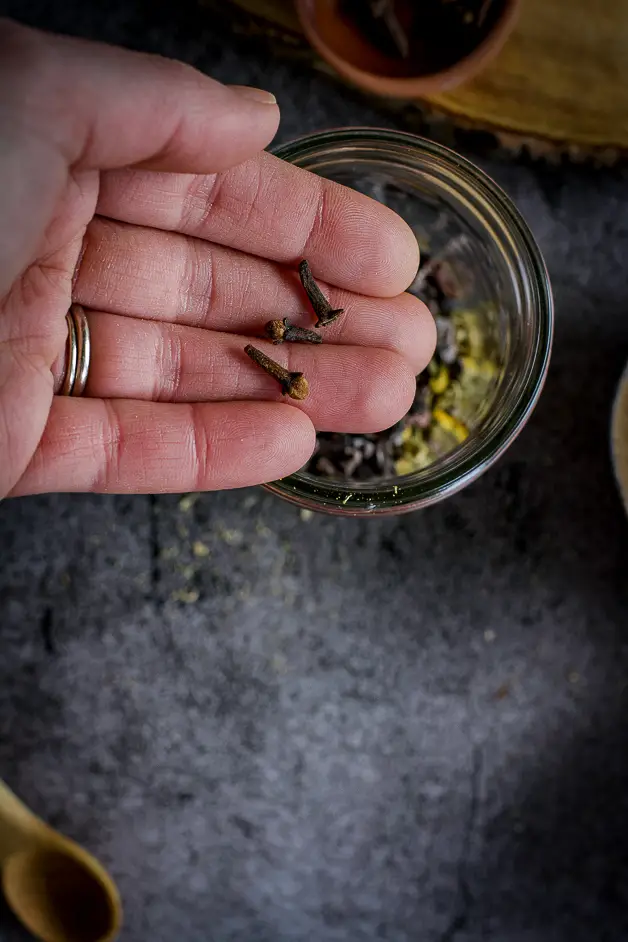
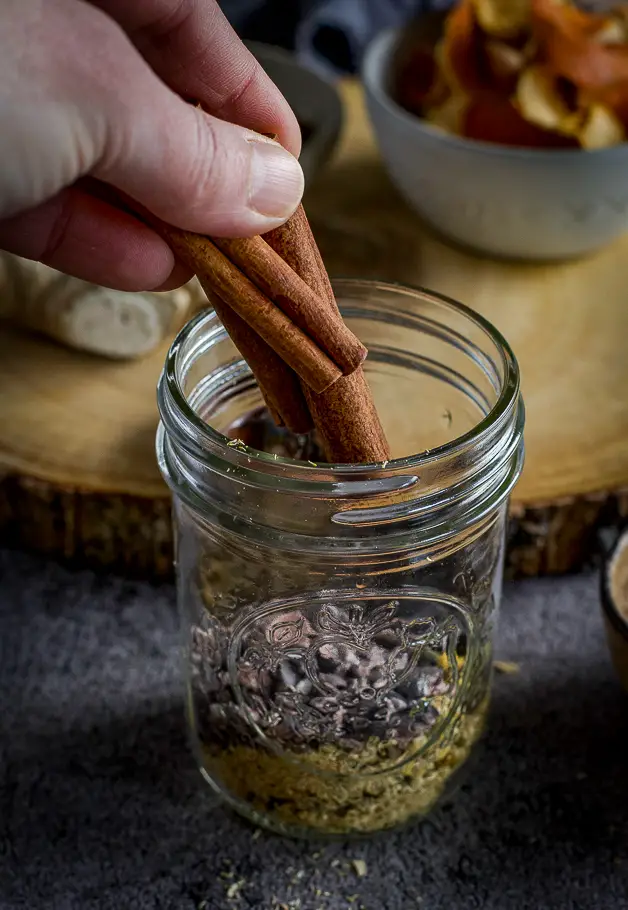
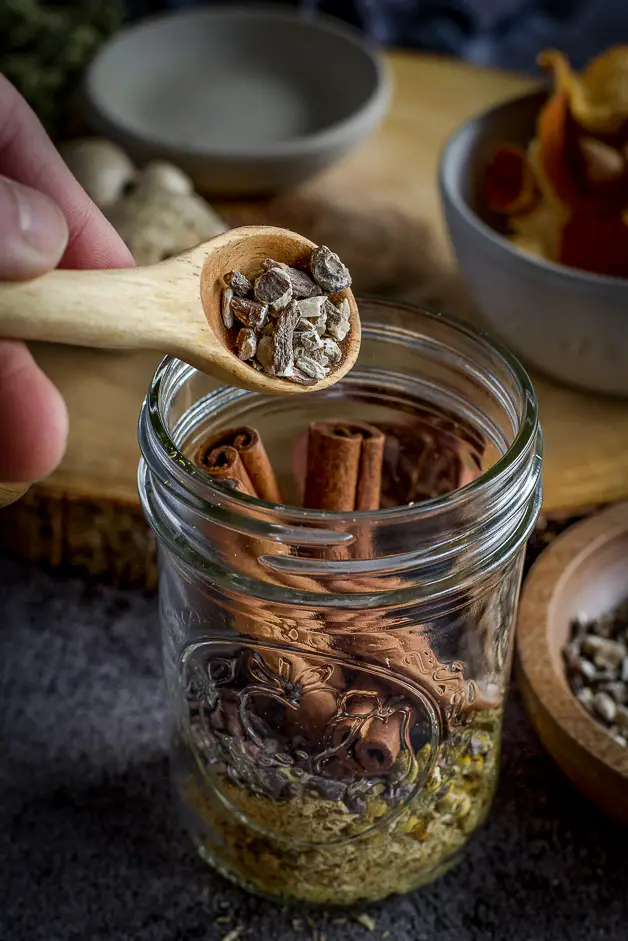
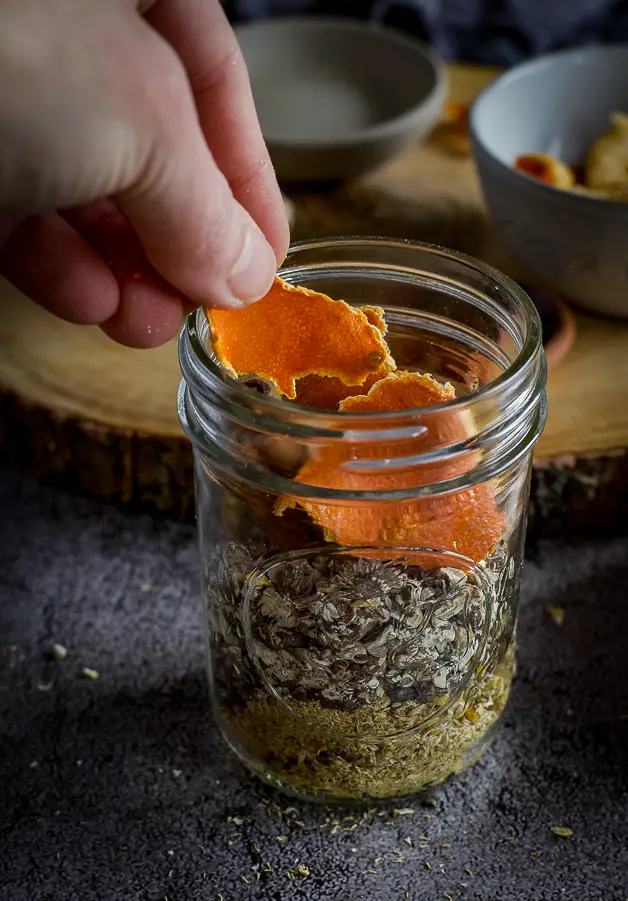
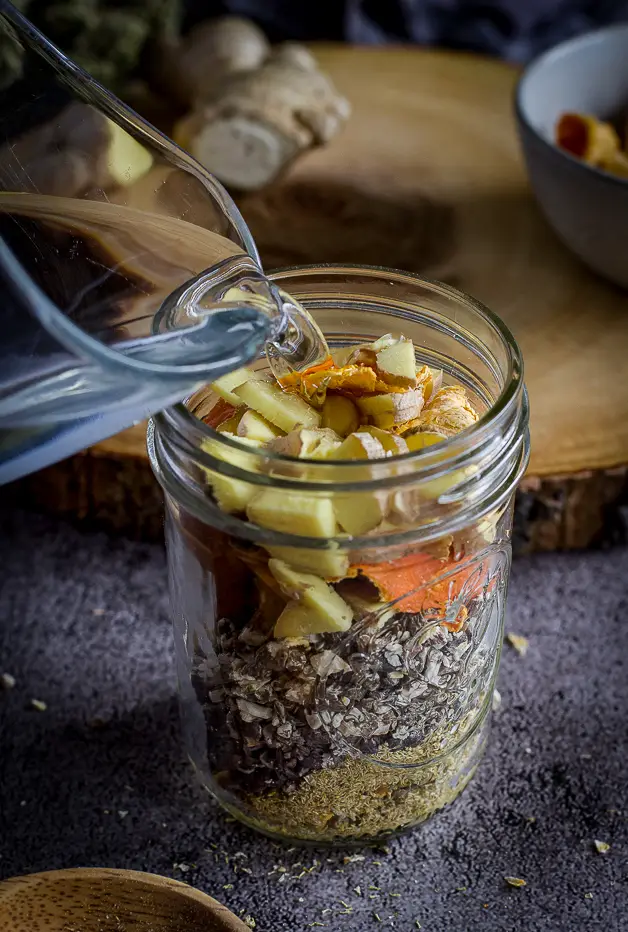
Let's Make It
Step 1. Add all the herbs into a 12-ounce mason jar and cover them with vodka until all ingredients are submerged.
Step 2. Label your jar and store the tincture in a cool dark place for 4-6 weeks, shaking it daily.
Step 3. Strain the herbs and pour the tincture into dropper bottles.
* The tincture will last for years but if you're using it every day, I recommend starting a new tincture soon after you bottle it so you don't run out.
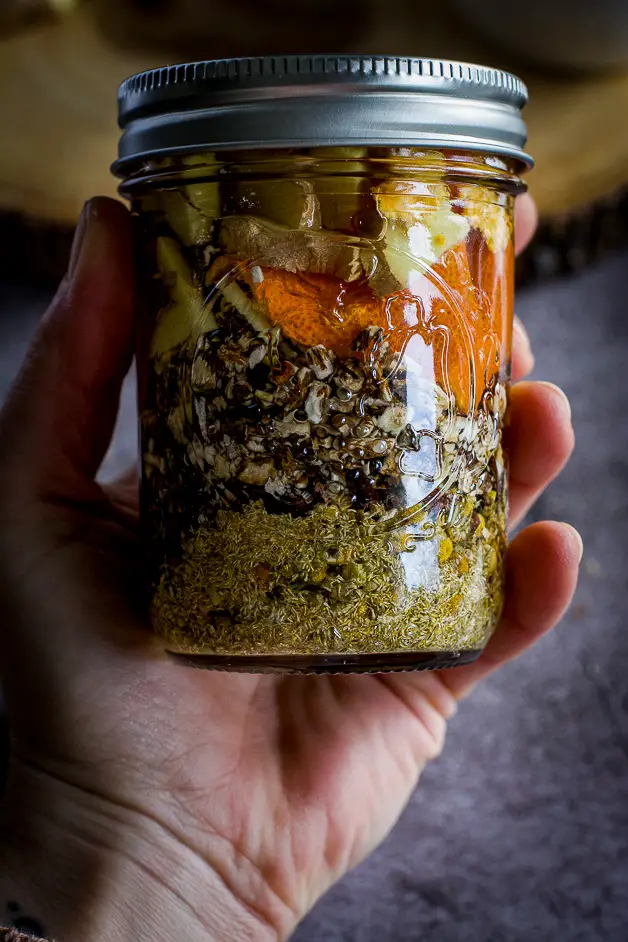
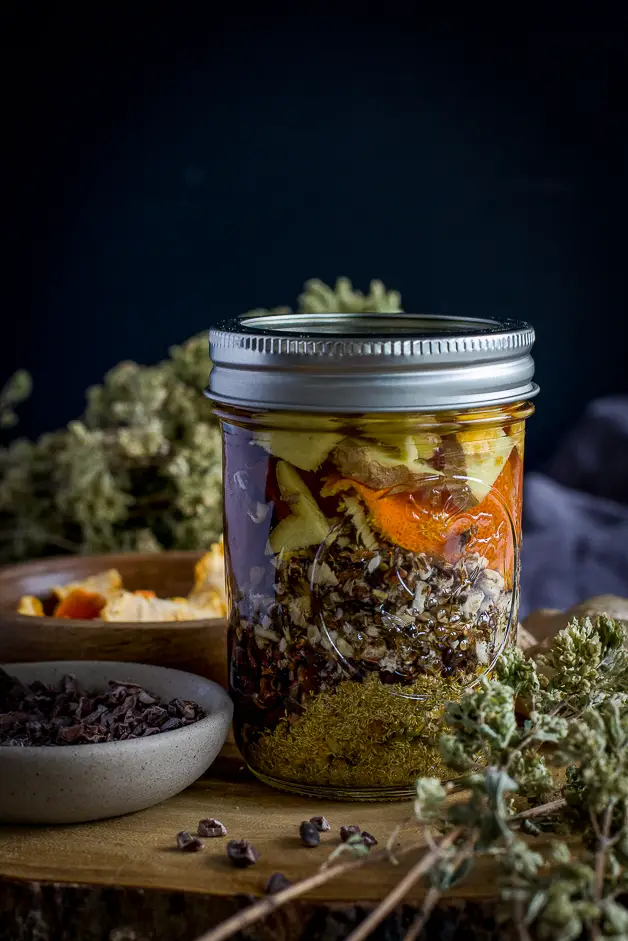
Top Tips + FAQs
Why Do Digestive Bitters Taste So Bitters?
You probably already know the answer. All the herbs in this digestive bitters tincture are bitter in nature. But there is still sweetness that comes through from cinnamon as well as the fruitiness from the citrus. The combination is well-rounded enough so it's not excessive. It certainly is nothing like wormwood, which is very, very difficult to tolerate. If you're curious about it, try wormwood tea and please let me know how it goes.
Why Do You Need Alcohol For Digestive Bitters?
Alcohol is a solvent that helps to extract all the beneficial compounds from any herb that is stepped in it. Alcohol is also a very good preservative, therefore tinctures can be stored for years.
What Alcohol Should You Use For Tinctures?
Vodka is generally the most neutral alcohol for making tinctures and is preferred over other solvents.
How Long Do You Let The Digestive Bitters Sit?
Some sources have said that as little as 2 weeks can still create a beneficial tincture, but I like tinctures to sit for at least 4-6 weeks. The longer they sit, the stronger in flavor they will be.
How Much Digestive Bitters Should You Take?
The typical dose for digestive bitters is ¼ teaspoon to ½ tsp. I typically use a dropper full as a good measure.
When Is The Best Time To Use Digestive Bitters?
In order to stimulate digestion, it's recommended that digestive bitters be taken about 10-20 minutes before meals. But you can also take them right before if that's when you remember, or even after meals to help with any digestive discomfort.
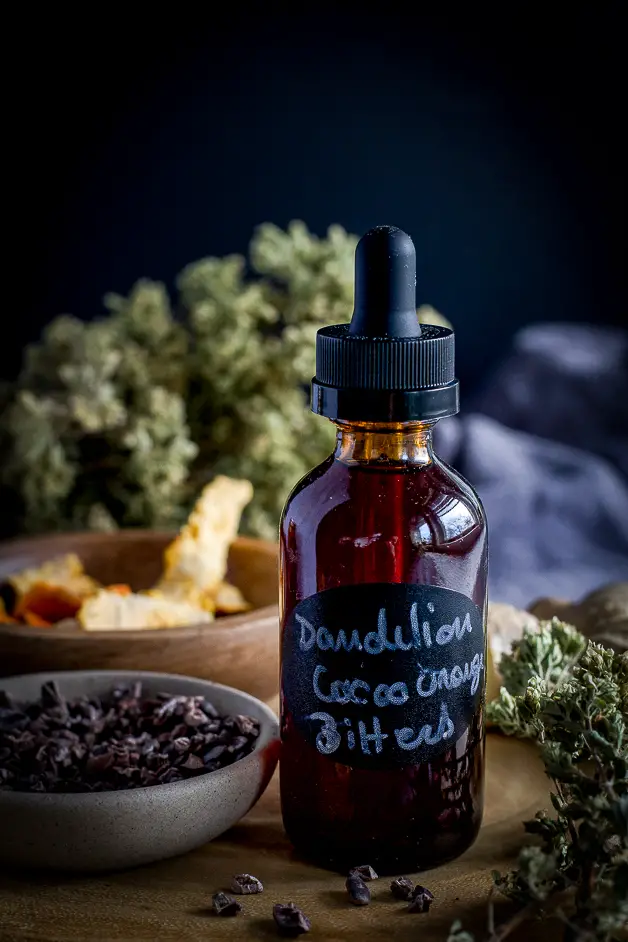
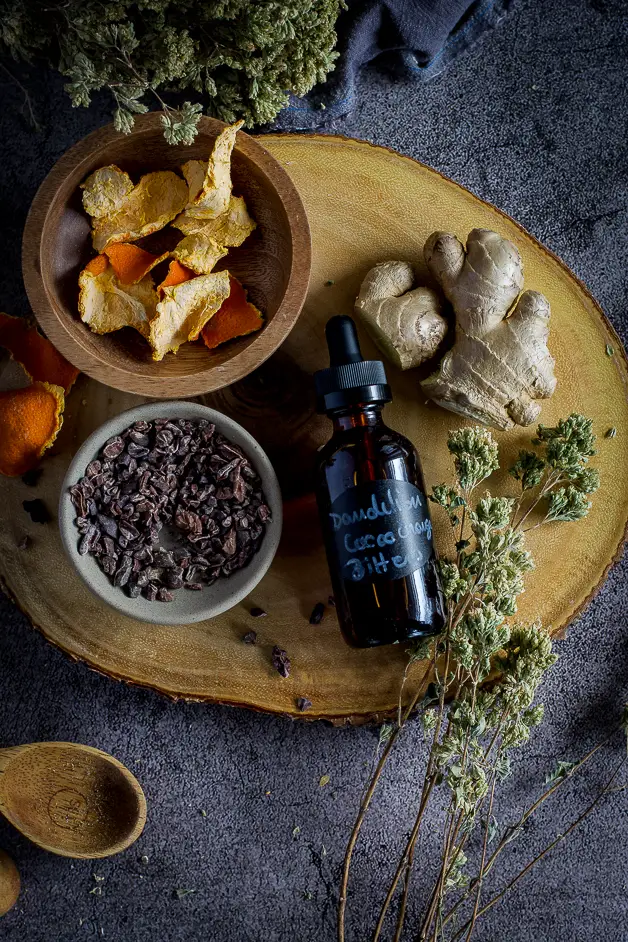
More Recipes You Might Like
How to Improve Digestion
Benefits Of Drinking Lemon Water Every Day
Simple Digestive Turmeric Cayenne Ginger Shot
Mom’s Gut-Healing Elderberry Fire Cider Recipe
How To Improve Digestion With Food Combining
📖 Recipe
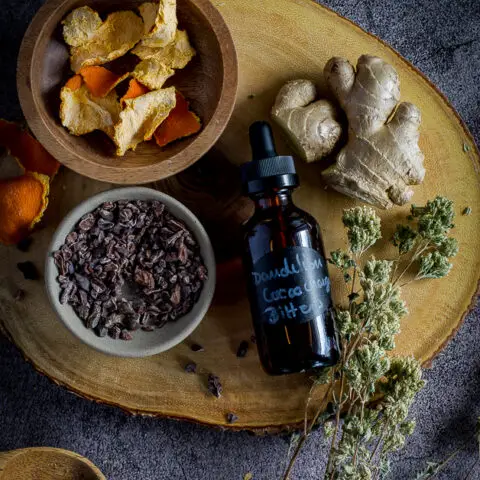
Dandelion Orange Ginger And Cacao Bitters Recipe
Improve your digestion simply by making this quick digestive orange ginger and cacao bitters recipe with ingredients you likely already have in your pantry.
Ingredients
- 2 tablespoon dandelion root
- 1" knob ginger sliced
- peel from roughly one orange
- 3 cloves
- 3-4 cinnamon sticks
- 1 tablespoon chamomile flowers
- 1 tbps cacao nibs
- enough vodka to fill the jar
Instructions
1. Add all the herbs into a 12-ounce mason jar and cover them with vodka until all ingredients are submerged.
2. Label your jar and store the tincture in a cool dark place for 4-6 weeks, shaking it daily.
3. Strain the herbs and pour the tincture into dropper bottles.
Notes
1. The tincture will last for years but if you’re using it every day, I recommend starting a new tincture soon after you bottle it so you don’t run out.
2. Store the tincture in a cool, dry place.
Nutrition Information:
Yield: 50 Serving Size: 1Amount Per Serving: Calories: 4Total Fat: 0gSaturated Fat: 0gTrans Fat: 0gUnsaturated Fat: 0gCholesterol: 0mgSodium: 0mgCarbohydrates: 1gFiber: 0gSugar: 0gProtein: 0g


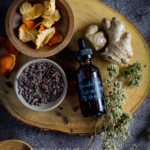



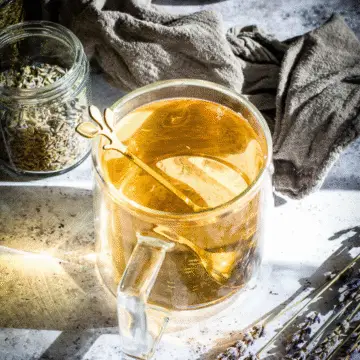
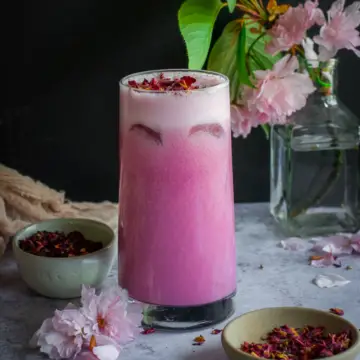
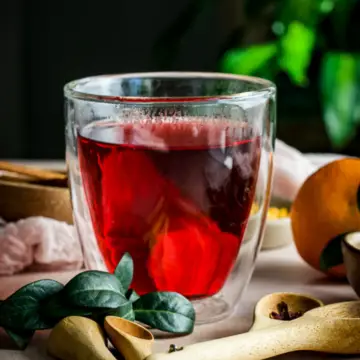
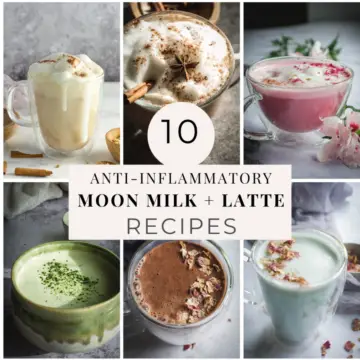
Mike
Good looking recipe - would it be too intense to sip a few ounces at a time? Thinking Malört or Jäegermeister
dmodesto
Hi Mike, yes, a dropper is really all you need. The theory behind it is to stimulate your digestion and for it to work as efficiently as possible.
Auggie.G
Would it be possible to use vegetable glycerin instead of alcohol? I'd really prefer to stay away from any alcohol consumption if at all possible?